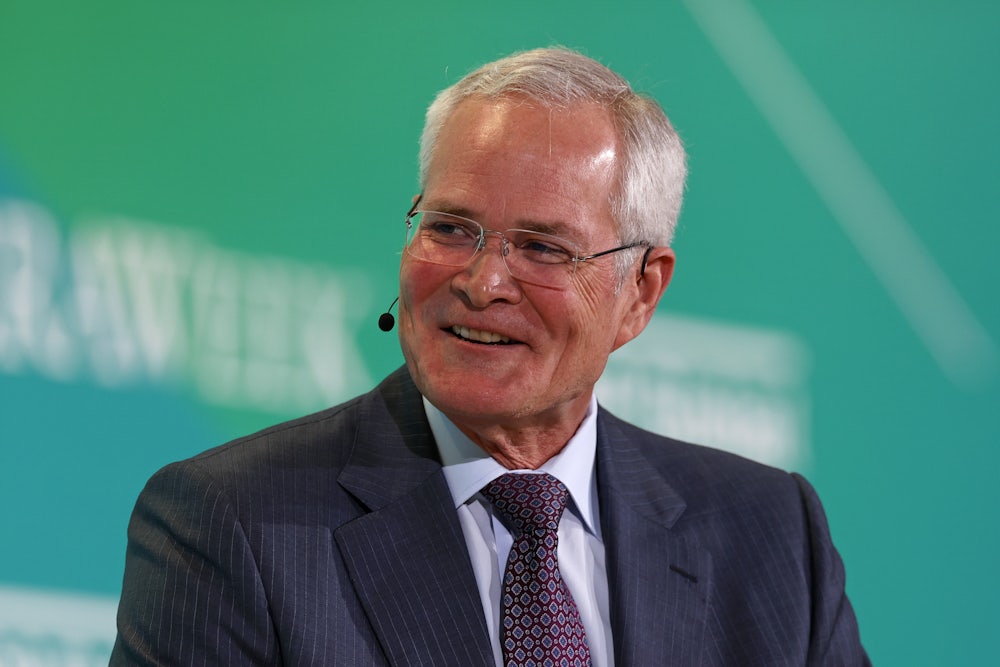An unlikely star emerged this week at CERAWeek by S&P Global, the giant annual gathering of oil and gas executives in Houston: the Inflation Reduction Act. It’s the Biden administration’s pride and joy, the biggest piece of climate legislation ever passed in the United States. And believe it or not, fossil fuel CEOs see a lot to like about it.
Oil and gas executives on stage this week approvingly called the IRA a “game-changer” and “framework for capital for years.” The IRA does contain some money to be dispensed to drillers. But the industry’s celebration of the IRA seems to be more about what this piece of legislation, passed only via painful compromise, symbolizes: the end—for now—of the potential for the U.S. to pass climate policy that will penalize the fossil fuel industry.
It’s been alarming, in the past few days, to see the only climate policy Congress will pass for the forseeable future get a stamp of approval from the planet’s biggest polluters. BP America head David Lawler called the IRA “a key enabler for starting the transition.” On Tuesday, ExxonMobil CEO Darren Woods praised it as a model for what climate policy should look like—and chided Europe for daring to tax him a little more instead. For Woods and others, the “carrots” furnished by the IRA are preferable to the unacceptable “sticks” being deployed in Europe, i.e., modest taxes on windfall profits.
Woods’s company had a hand in shaping what the IRA ended up looking like. Reporting by the Greenpeace investigative outlet Unearthed revealed that Exxon lobbyists were in frequent touch with members of Congress as the IRA’s predecessors limped through the Capitol. Exxon lobbyist Keith McCoy claimed to have spoken weekly to West Virginia Joe Manchin—who incidentally addressed CERAWeek on Friday. (He also attended CERAWeek last year, when he notably referred to a roomful of oil and gas execs as “we,” seeming to count himself among them.) Manchin witholding his swing vote until the act was watered down was a key reason why the IRA appeals to Woods and his fellow executives, lacking even the dull teeth—like a program shifting utilities away from fossil fuels—included in earlier iterations of Build Back Better.
Those executives can now breathe easy. Whatever window there might have been for Congress to pass more punitive climate policy closed once Democrats lost their majority in November. What did manage to pass is a package that fossil fuel companies can live with and maybe even come to love. For big companies, especially, new and expanded tax breaks for things like carbon capture and storage and hydrogen pay them more to do things they were already doing. Woods credited the IRA with helping them enter the carbon capture and storage business, and Occidential Petroleum (“Oxy”) says the IRA was a factor in its decision to boost its own low-carbon spending by a third. The IRA increased the tax credits Oxy can collect for using captured carbon to drill more oil—a process known as enhanced oil recovery—from $35 per ton to $130 per ton. If it keeps that carbon stored permanently, it can get $150 per ton, compared to the $50 per ton credit that was available previously.
Allyson Anderson Book—chief sustainability officer at Baker Hughes, an oilfield services (“energy technology”) company—was enthusiastic about the opportunities presented by the IRA. It’s already provoked “a little bit” more investor interest in carbon management technologies, hydrogen, and geothermal, which uses similar equipment and expertise to oil and gas drilling operations. “It’s all about getting the cost down,” Anderson Book said.* “There’s lots of great stuff across the board.” Like several other speakers this week, she was careful to mention that Baker Hughes was also eagerly pushing for permitting reform, a somewhat ambiguous catch-all term for changes to how infrastructure (including the sort incentivized by the IRA) gets approved. (In environmentalists’ worst-case scenario, this means fast-tracking oil pipeline projects, for example.)
Not all companies are so well poised to take advantage of tax credits offered by the IRA. Those with smaller balance sheets, and without divisions looking into opportunities for capturing carbon, may see fewer opportunities to profit from the legislation. But it’s not something they’re too sore about.
George David Banks, a senior fellow at the Atlantic Council who advised Republicans on the House Select Committee on the Climate Crisis and served in the Trump administration, said that there was “acknowledgment that there are a lot of opportunities” in the IRA, albeit lingering worries about permitting reform, in particular, which speakers referenced frequently as a bone of contention with Democrats. “Here, clearly, the IRA is not a politicized issue,” he added. “Industry just doesn’t view the IRA in that sense. And even amongst Republicans that’s kind of cooled off.”
So how should those concerned about climate change evaluate the IRA, now that it’s clear fossil fuel execs see the act as a kind of victory? The IRA will do plenty of good in the world, of course. But even the bill’s biggest boosters agree that it’s not a holistic plan to decarbonize the U.S.
Oil and gas executives haven’t forgotten the threat that climate policy might eventually pose to their core business model. Alongside the praise at CERAWeek were the usual grievances. “There is still a very vocal what I believe to be minority of ideologues who have jumped from the problem statement which is reducing emissions,” Woods complained, “to the problem statement of getting rid of oil and gas.” Tellurian Chief Executive Octávio Simões hit back at his critics too. “It is time for us as an industry to stop tiptoeing about the value of natural gas. It’s an incredible fuel, and we’re not afraid to burn it in our kitchens,” he said, apparently referring to the growing body of research that gas-burning stoves cause asthma in children and a host of other health problems. The line met with applause and at least one shout from the back of the room: “Thank you!”
The White House has opted to respond to these executives’ tantrums with positive reinforcement. In her speech at CERAWeek, Energy Secretary Jennifer Granholm spoke to a room full of millionaires as if she were addressing a middle-school graduation. “Someone is going to write this chapter of history,” she said, proceeding to motion to CERAWeek founder and emcee Daniel Yergin, the venerable energy industry chronicler and author of The Prize: The Epic Quest for Oil, Money and Power. “Who is he going to be writing about? What courageous visionaries in this room will be shaping this chapter?”
More worrying than Granholm’s decision to call fossil fuel execs “courageous visionaries” was her regurgitation of the industry’s longtime talking point on decarbonization. “We know that oil and gas is going to remain a part of our energy mix for years to come. In the middle of the century we are going to be using abated fossil fuels,” she added, tipping a hat to the theory—popular among CEOs—that expanding the production of fossil fuels is fine so long as their emissions are somehow erased by carbon capture technologies that still remain untested at scale.
Perhaps, then, Exxon and BP praising the IRA isn’t so surprising and even indicates a broader consensus. While Biden on Thursday proposed eliminating fossil fuel subsidies as a balm to his reelection base, he did so as part of a budget he knows will never pass. For now, when it comes to the essentials, the White House and the fossil fuel industry seem to be broadly on the same page.
* An earlier version of this piece misstated Allyson Anderson Book’s middle name.










